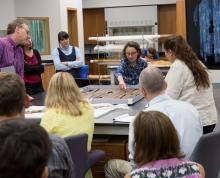Many universities offer courses in the conservation of cultural heritage. Programs for practical conservation are often offered at the graduate level and have specific requirements. Universities with important collections can raise awareness and appreciation of the importance of cultural heritage in many ways. In a world where the response to the deterioration and destruction of our cultural heritage worldwide often seems too little too late, can universities make a more significant contribution? A Panel with experience in conservation education in response to global needs and in the use of university collections for teaching assesses the current situation, discusses possible initiatives, and responds to presentations by faculty members of universities in Brazil, Chile, China, Jordan, Peru, South Korea, Tanzania, Turkey, and the United Kingdom. After the discussion, questions will be invited from the audience.
The Panel.
- Ian McClure (moderator), Yale University Art Gallery, New Haven, USA
- Introduction.
- Graduate conservation internships and fellowships and teaching undergraduate courses at Yale
- Debra Hess Norris, University of Delaware, Wilmington, USA
- Educating Future Conservators: American Programs of Study
- Anupam Sah, CSMVS Museum, Mumbai, India
- Cultural Heritage Conservation in India
- Pamela Franks, Yale University Art Gallery, New Haven, USA
- Yale University Art Gallery and its mission as a teaching museum
- Norman Duncan, University of Pretoria, South Africa
- A new program for the University of Pretoria
- Alison Gilchrest, Andrew W. Mellon Foundation, New York, USA
- The Andrew W. Mellon Foundation; supporting conservation education and training and other cultural heritage programs
Contact Ian McClure, Chair of the IPCH Conservation Lab and Chief Conservator of the Yale University Art Gallery (ian.mcclure@yale.edu), with questions regarding this panel discussion.
The Panel is free and open to the public. Its outcome will inform the discussions at the UN Global Colloquium about gaps in research and training and possible future areas of institutional collaboration. The conclusions of the panel will be presented by a rapporteur to the UN Global Colloquium Plenary on April 13th. The intention will be to film and make the panel discussion available to the public.
Planning committee for this event: Ian McClure, Debra Hess Norris (University of Delaware), Molleen Theodore






